DETROIT: THE WRONGUL CONVICTION OF C. EMMANUEL SQUIRES ON THE WORD OF COP WILLIAM ‘ROBOCOP’ MELENDEZ, CONVICTED LIAR AND MURDERER
 Below VOD’s local story on the Squires case is the USA TODAY article: HUNDREDS OF POLICE OFFICERS ARE ALLEGED LIARS. SOME STILL HELP SEND PEOPLE TO PRISON.
Below VOD’s local story on the Squires case is the USA TODAY article: HUNDREDS OF POLICE OFFICERS ARE ALLEGED LIARS. SOME STILL HELP SEND PEOPLE TO PRISON.
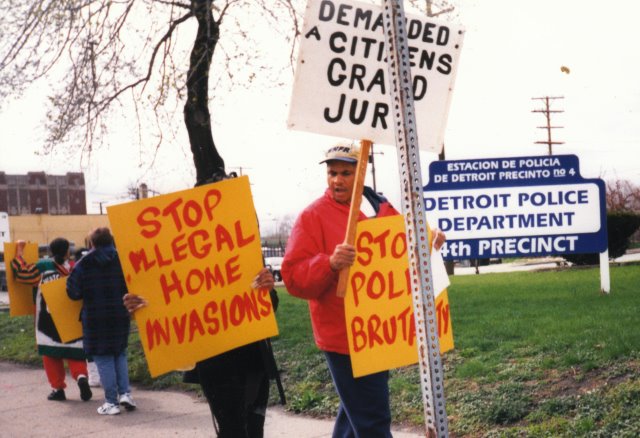
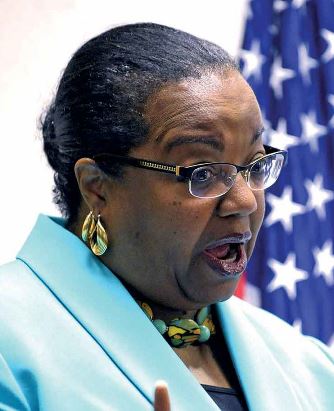
Kym Worthy, Circuit Court Judge for 10 years, denied motion based on cop’s history of false reports.
The late Cornell Squires and community members march on the DPD 4th Pct. against brutal, corrupt cops, in 2003. His son Emmanuel Squires was falsely convicted in 2000 of “assault with intent to rob (armed)” on the word of DPD officer William “Robocop” Melendez although no gun was ever found. He spent 2 years in prison.
Then Judge Kym Worthy denied a post-conviction motion by the defense for a new trial after it was discovered that Melendez had been convicted of “filing a false report,” a four-year felony.
In 2004, the US DOJ, with the assistance of the Detroit Law Department, charged Melendez and other officers from the 3rd and 4th precincts with numerous felonies involving extreme brutality, false arrest and frame-ups. For the first time in memory, nine Black officers broke the “blue wall of silence” and testified AGAINST the white and Hispanic officers charged. Many convictions were overturned, but a jury returned a “nullification” verdict of “not guilty” on the cop gang after a defense attorney focused on the civilian victims, saying, “Would YOU want people like these living in your neighborhoods?”
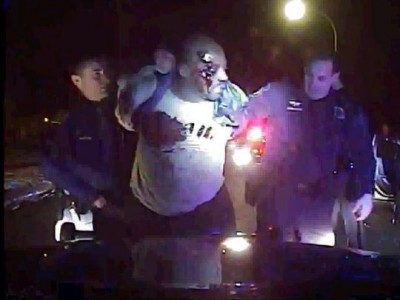
Floyd Dent after beating by “Robocop” Melendez et al on Jan. 28, 2015.
In 2017, the story of Melendez’ brutal beating of Black motorist Floyd Dent in Inkster, Michigan went viral, and he was convicted on those charges. Melendez had been hired by both the Inkster and Highland Park Police Departments, If Worthy had stopped him in his tracks in 1999, his subsequent offenses including a murder in Inkster could have been prevented. Dent was nearly killed by Melendez in the beating. Melendez planted drugs in the trunk of his car, but those charges against Dent were later dropped. Melendez was later sentenced to 1 to 10 years in prison, but served only 14 months.
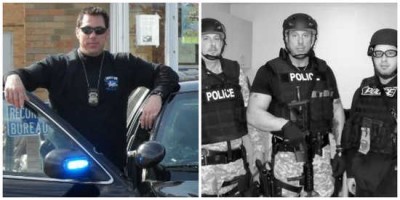
William ‘Robocop’ Melendez
Cornell Squires commented, “Now he has a criminal record, now he will get to feel what it is like to be on the other side. But he’s still getting preferential treatment—this is the second time they didn’t put handcuffs on him when they led him off. How many people has he put in jail, maimed and destroyed their lives, like he framed my son and gave him a record? He should have been locked up a long time ago. They need to revisit every case he had a part of; everyone should be exonerated.”
 Video above: William Melendez is the officer on the left who drags Floyd Dent out of his car and then proceeds to punch him in the head and elsewhere multiple times. Dent suffered permanent injuries.
Video above: William Melendez is the officer on the left who drags Floyd Dent out of his car and then proceeds to punch him in the head and elsewhere multiple times. Dent suffered permanent injuries.
On Oct. 31, 1999, Detroit police officer William “Robocop” Melendez, acting in plainclothes, arrested the 18-year-old son of Detroit Coalition Against Police Brutality member Cornell Squires, Emmanuel Squires, and falsely charged him with attempted carjacking and assault with intent to rob (armed). The teen was standing on a street corner near his southwest Detroit home with two friends, where he lived with his father, with two friends. He faced a sentence of up to life without parole.
Earlier, the younger Squires had witnessed a brutal attack on his father by DPD officer Robert Feld, who threw him through the door of their home on S. Electric because he asked why the police were questioning his son on the street, and began beating him. Cornell Squires’ father and mother, who lived across the street, ran to their son’s defense and forced Feld to stop the beating. But afterwards, the grandfather Eugene Squires Sr. suffered a heart attack which contributed to his death months later. The younger Squires was very close to his grandfather and traumatized by that event.
When the younger Squires was accosted later by Melendez, his father ran to his defense and videotaped the arrest. In the videotape, dozens of DPD officers are seen searching the area for the gun Melendez claimed the younger Squires threatened him with, with no success. At trial, Melendez testified to the alleged armed robbery, while the younger Squires’ friends were threatened with charges if they testified on his behalf. The presiding judge was Kym Worthy, now the Wayne County Prosecutor.
She allowed the videotape to be shown only without sound, which would have revealed police expressing doubt about the existence of the gun, and an officer in charge telling Squires that his son would be charged only with disorderly conduct. The younger Squires, weeping, said at trial only that he missed his grandfather. The jury found the younger Squires not guilty of attempted carjacking, but guilty of assault with intent to rob (armed). Worthy sentenced him to 24 mos. to 10 years in the MDOC, despite his clean record.
Subsequently, defense attorney Shaun Neal discovered that Melendez had been convicted of “filing a false report,” a four-year offense. That was never disclosed during the trial. Neal filed a motion for a new trial, which Worthy denied, and the younger Squires was shipped off to the MDOC, where he spent more than two years. His experience in prison further traumatized the young man. After a lifetime of advocacy for the people of Detroit, his father died of a heart attack in 2016, leaving his son and the two grandchildren he called his “baby bears” without a significant guiding force in their lives.
http://voiceofdetroit.net/2015/04/19/stop-police-murders-and-frame-ups-of-our-black-youth-jail-killer-cops/. (Article by Cornell Squires, who was also a VOD reporter.)
______________________________________________________________
REVAT VERA SPENDS 11 YEARS IN JAIL STUDYING LAW TO PROVE HIS INNOCENCE, FINALLY FREED
Across the USA, prosecutors aren’t tracking officer misconduct, skirting Supreme Court “Brady” rules and leading to wrongful convictions–USA TODAY
 By Steve Reilly, and Mark Nichols, USA TODAY
By Steve Reilly, and Mark Nichols, USA TODAY
Updated 3:26 p.m. EDT Oct. 17, 2019
(Some photos, videos added by Voice of Detroit)
Revat Vara should not have gone to prison.
One night in 2006, Houston police pulled him over for a missing license plate and told him to walk a straight line.

Houston DWI Task Force/FB
Vara said that he hadn’t had a drop to drink and that he passed the sobriety test. Officer William Lindsey said otherwise.
At trial, jurors were told about Lindsey’s expertise evaluating drunken drivers. They were told about Vara’s two previous DWIs.
What jurors weren’t told: Officer Lindsey had been found guilty of misconduct by his department 35 times. He was investigated for padding his overtime – by manipulating DWI arrests so he would have to be called to testify – among many other violations.
Revat Vara spent 11 years in prison because of a missing front license plate and prosecutors’ failure to disclose the disciplinary history of the officer who testified against him. Since his exoneration, he’s been living in Houston.
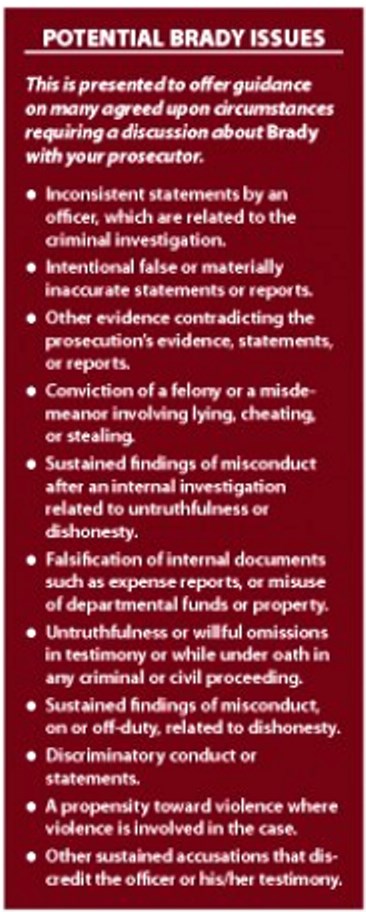 In a case that came down to one man’s word against another’s, jurors believed the police officer. Because of his prior offenses, Vara was sentenced to 25 years in prison.
In a case that came down to one man’s word against another’s, jurors believed the police officer. Because of his prior offenses, Vara was sentenced to 25 years in prison.
What happened to Vara has been unconstitutional for more than 50 years.
The U.S. Supreme Court ruled in 1963 that prosecutors must tell anyone accused of a crime about all evidence that might help their defense at trial. That includes sharing details about police officers who have committed crimes, lied on the job or whose honesty has been called into doubt.
A USA TODAY Network investigation found that widespread failure by police departments and prosecutors to track problem officers makes it impossible to disclose that information to people whose freedom hinges on the integrity of law enforcement.
Reporters for USA TODAY and its partners, including the Chicago-based Invisible Institute, spent more than a year gathering Brady lists from police and prosecutors in thousands of counties to measure compliance with the landmark 1963 ruling in Brady v. Maryland.
The investigation found:
Thousands of people have faced criminal charges or gone to prison based in part on testimony from law enforcement officers deemed to have credibility problems by their bosses or by prosecutors.
At least 300 prosecutors’ offices across the nation are not taking steps necessary to comply with the Supreme Court mandates. These places do not have a list tracking dishonest or otherwise untrustworthy officers. They include big cities such as Chicago and Little Rock and smaller communities such as Jackson County, Minnesota, and Columbia County, Pennsylvania.
In many places that keep lists, police and prosecutors refuse to make them public, making it impossible to know whether they are following the law.
Others keep lists that are incomplete. USA TODAY identified at least 1,200 officers with proven histories of lying and other serious misconduct who had not been flagged by prosecutors. Of those officers, 261 were specifically disciplined for dishonesty on the job.
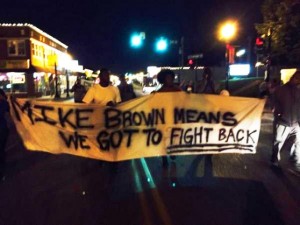
Protest after brutal killing of 18-year-old Michael Brown in Ferguson, MO
The inconsistent compliance with the Brady requirements comes amid a nationwide debate over law enforcement tactics. A string of killings by police over the past five years in Ferguson, Missouri, Baltimore, Chicago and elsewhere have sparked unrest and a reckoning that put pressure on cities and mayors to crack down on problem officers.
The revelations also come as reversals of wrongful convictions pile up. The National Registry of Exonerations shows that cases overturned because of perjury and official misconduct by prosecutors or police have more than doubled from 2008 to 2018.
Houston man spends 11 years in jail studying law to prove his innocence
Revat Vara was sentenced to 25 years in prison for a crime he did not commit. He spent 11 years in jail studying law to overturn his conviction.
USA TODAY talked to dozens of prosecutors and police officials across the nation.
Two county prosecutors promised to alter their policies or procedures for complying with Brady’s requirements in response to inquiries from USA TODAY.
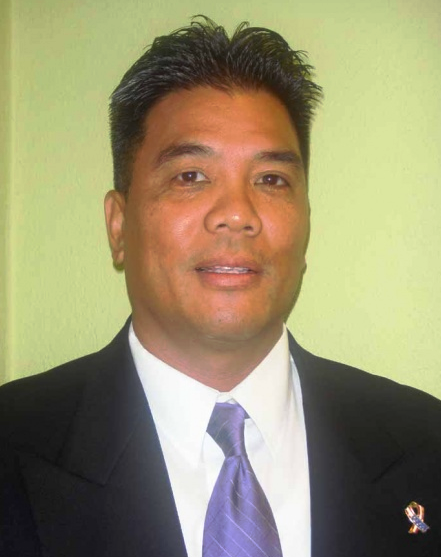
Maui County Prosecutor John Kim
“Now that you have raised this issue, we will consult with our corporation counsel and our circuit court supervisor about creating and maintaining a list,” Maui County Prosecutor John Kim told the newspaper.
Most prosecutors who don’t keep a Brady list said they don’t need one because they know all of their police officers well.
“I do not have a so-called Brady list. I do not have a written policy,” said Steve Giddens, the district attorney in Talladega County, Alabama. “I do not need one to follow the law.”
Others raised concerns about unfairly jeopardizing law enforcement officers’ jobs by placing them on a list based on minor or unfounded accusations.
Unions representing law enforcement officers have been especially outspoken opponents. In California, the union representing Los Angeles County sheriff’s deputies went to court to stop the department from disclosing 300 deputies with misconduct histories. The state Supreme Court ruled against the deputies in August.
The lists are not designed to track people who should not be officers. Rather they are a tool prosecutors use to identify those whose past conduct might raise questions about their fairness or truthfulness as a witness in a trial – and require disclosure to defendants.
The argument about maintaining the lists or making them public has led to political battles, especially in cities where newly elected prosecutors have made fighting police misconduct part of their platform.
A training manual for Brady disclosure in the Philadelphia District Attorney’s Office states that the general rule is “Disclose. Disclose. Disclose.”
The tack has put the prosecutor’s office at war with the Philadelphia police union, which called the office’s maintenance of a Brady list a “witch hunt.”
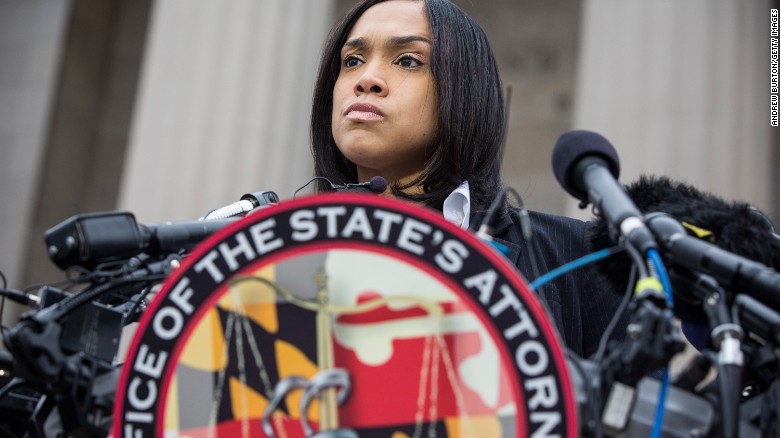
Maryland State’s Attorney Marilyn Mosby
In Baltimore, State’s Attorney Marilyn Mosby started forcing officers who could be witnesses to disclose their internal affairs investigations. Mosby is noted for filing charges against nine Pittsburgh police officers in the 2015 death of Freddie Gray, Jr.,at the height of the national “Black Lives Matter” protests across the U.S.
Mosby appointed a “criminal discovery liaison” to review all court-related requests for officers’ internal affairs information and send detailed records to prosecutors and other parties within 48 hours.
Mosby said the effort was necessary to increase trust and transparency in the city’s criminal justice system after years of scandal around corrupt police units and the increased tension between residents and police since the death of Freddie Gray while in police custody in 2015.
Last year, the state’s attorney’s office started reviewing court cases involving at least 25 Baltimore police officers because of misconduct charges against them.
************************************************************************************
Baltimore prosecutor seeks to throw out nearly 800 criminal convictions
By Josh Girsky, Taylor Romine and Jean Casarez, CNN
Updated 10:41 PM ET, Fri October 4, 2019
https://www.cnn.com/2019/10/04/us/baltimore-police-corruption-cases/index.htm
*********************************************************************************
Prosecutors recently began asking the courts to vacate nearly 800 convictions that involved testimony or investigations by these officers – and more could be coming as the office continues to gather information.
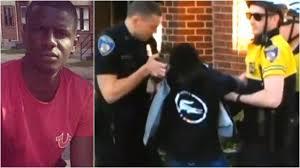
Freddie Gray during his arrest by Baltimore police later charged with his death.
More than 530 Baltimore police officers have been added to an internal notification system, and defense attorneys are contacted if those officers are considered by prosecutors as witnesses. That list includes 183 officers who, because of their backgrounds, are automatically disclosed to the defense.
For Vara, who spent a decade behind bars for a crime he said he didn’t commit, an easily available Brady list could have changed his life.
At the time of his trial, Houston police and the Harris County prosecutor’s office were aware of Lindsey’s history of misconduct. As part of its last investigation into Lindsey, the police department asked the prosecutor’s office to charge him with a crime. The officer resigned rather than answer more questions – months before Vara’s trial.
Vara’s attorneys said the case boiled down to Lindsey’s word against Vara’s.
“There’s no breath test, no blood tests,” said Celeste Blackburn, who represented Vara on appeal.
Blackburn said Lindsey was the only police officer present that night to testify that Vara was drunk. In fact, court records indicate the other two officers said the smell of alcohol could have come from the passenger – a drunken buddy with whom Vara had gone out that night to give a safe ride home.
Neither Vara nor his defense lawyer knew about Lindsey’s history at the time of trial.
“It’s crazy and it’s scary how these guys got the power to change your life like that,” Vara said. “The badge and that uniform gives them the power to do that.”
A police union attorney informed the Houston Police Department in 2006 that Lindsey would not respond to the allegations, department records show. At Vara’s trial, Lindsey testified that he left law enforcement to pursue his love of teaching. He could not be reached for comment for this article.
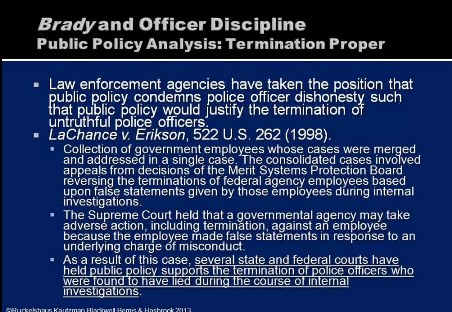 For decades, U.S. courts have set a high standard for prosecutors when it comes to disclosing problems in police officers’ pasts that might raise questions about their honesty and integrity as witnesses.
For decades, U.S. courts have set a high standard for prosecutors when it comes to disclosing problems in police officers’ pasts that might raise questions about their honesty and integrity as witnesses.
Building on Brady vs. Maryland, a landmark case that exonerated a wrongfully convicted Maryland man, courts have repeatedly held that prosecutors must tell defendants what they know about law enforcement officers’ backgrounds.
In a series of separate rulings, the Supreme Court has said that means prosecutors should know the backgrounds of the officers they rely on to put people in prison – and they must tell defendants what they know, whether they ask or not.
“Society wins not only when the guilty are convicted, but when criminal trials are fair,” Supreme Court Justice William Douglas wrote in the Brady decision.
Legal scholars have generally interpreted the rulings as a requirement that prosecutors create a list of officers with credibility problems.
But there is no comprehensive rule for what kind of behavior lands an officer on a list and few repercussions for police and prosecutors who flout the requirement.
As a result, how the Brady disclosure rule is applied depends heavily on individual prosecutors in thousands of jurisdictions nationwide.
Some prosecutors include only officers who have lied in court or falsified evidence. Others list those who have committed crimes, including drunken driving, or shown racial bias on the job. USA TODAY found wide variation in the level of documentation or investigation underlying officers’ inclusion on the list. Some might have been convicted criminally or flagged by judges for lying in court. Others had been found guilty in internal investigations. And many have been accused of wrongdoing and their cases are pending. In some cases, prosecutors’ lists don’t even say why an officer’s name is there.
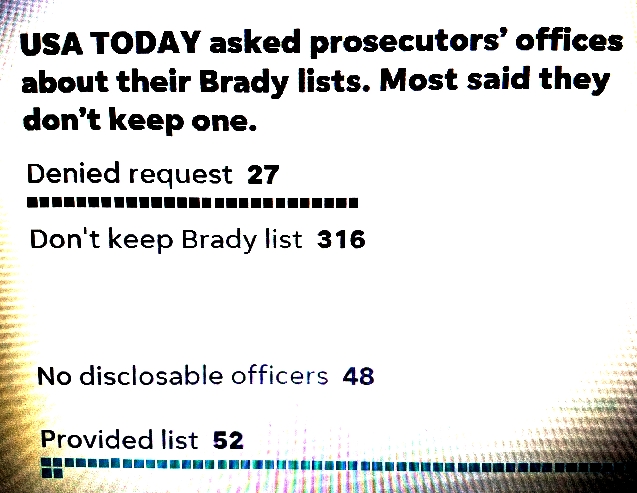
VOD asked Wayne County Prosecutor Kym Worthy’s office if she keeps a Brady list, and if not, why not. No response was received.
Explore: Search hundreds of prosecutors’ responses to USA TODAY’s questions about Brady lists
In Miami-Dade County, internal training presentations obtained by USA TODAY show prosecutors being taught legal tactics to avoid disclosing officers’ histories.
The documents say prosecutors don’t have to go out of their way to disclose, and the burden of proving they covered up a questionable officer’s history is on the defense.
Prosecutor training in Miami
In Miami-Dade County, internal training presentations obtained by USA TODAY show prosecutors being taught legal tactics to avoid disclosing officers’ histories. The documents say the burden of proving they covered up a questionable officer’s history is on the defense. The end of the slideshow casts disclosure as a game of strategy between prosecutors and the defense.
http://voiceofdetroit.net/wp-content/uploads/Miami-prosecutors-Brady-training-slides.pdf
“Mere speculation by defense that information MAY be exculpatory is not enough to trigger state’s obligation to disclose,” the presentation states.
The end of the Miami training slideshow casts the strategy of hiding officer misconduct as a contest between prosecutors and the defense.
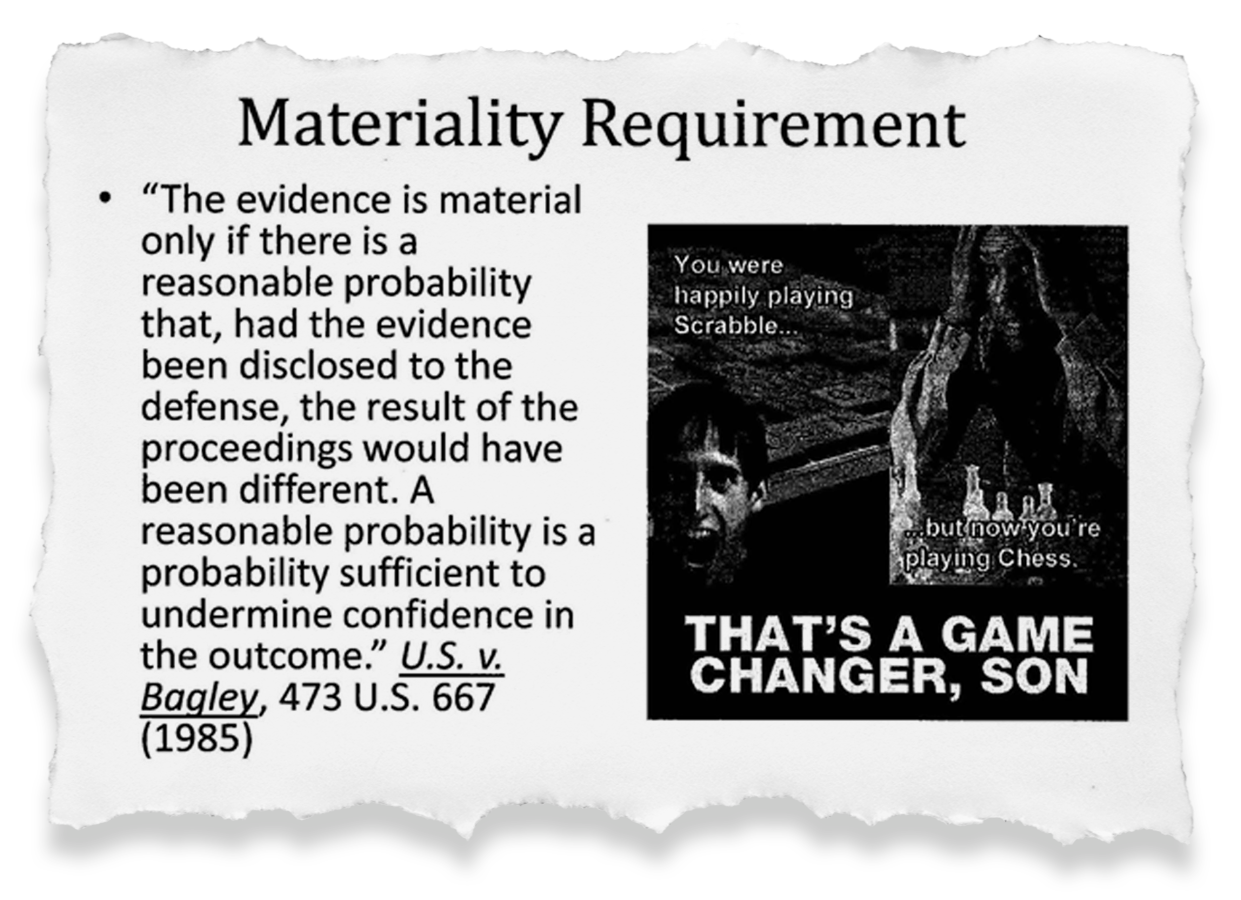 “You were happily playing Scrabble … but now you’re playing Chess,” one slide reads. “THAT’S A GAME CHANGER, SON.”
“You were happily playing Scrabble … but now you’re playing Chess,” one slide reads. “THAT’S A GAME CHANGER, SON.”
Ed Griffith, a spokesman for Katherine Fernandez Rundle, the elected state attorney in Miami-Dade County, contended the presentation does not provide instructions on avoiding disclosure of Brady material and said the chess game comparison in the slide was an attempt to “add a level of attention-getting levity to a very serious subject.”
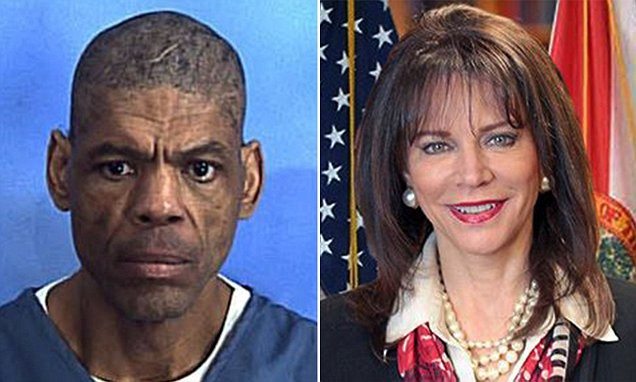
M-D County Atty. Katherine Fernandez Rundle refused to charge 4 prison guards with murdering prisoner Darren Rainey by throwing him into a scalding hot shower for two hours. She also refused to bring charges in the police murder of Latino graffiti artist Israel Hernandez.
“The problem with levity is that it does not always accomplish its intended goal,” he said. “This appears to be one of those situations.”
Bennett Gershman, a former prosecutor and now Pace Law School professor, said the courts have made it clear the burden is on prosecutors and leans heavily toward disclosure. Failing to disclose is not a game to be won, Gershman said, but a duty designed to protect the integrity of the court system.
“It’s dishonest if that’s the way they’re presenting the obligation of Brady,” he said.
Gershman said the lack of tracking and policies about disclosing officers’ misconduct is troubling because it’s at the heart of the legal system’s promise to provide every defendant a fair trial – a standard prosecutors are sworn to protect.
“If you’re putting a witness on the stand – whoever the witnesses, but particularly a police officer – and you have doubts about his credibility, doesn’t that raise a question of whether you’re prosecuting a guilty or an innocent person?” Gershman asked.
USA TODAY sought records and comments from nearly every state prosecutor in the country to compile the first national view of where Brady lists exist and don’t.
Nearly half the prosecutorial districts that responded reported not keeping an official list. More than 1,000 did not respond to the requests at all.
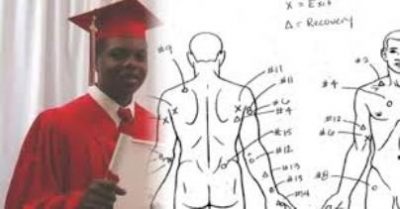
Laquan McDonald with autopsy results showing he was shot 16 times by Chicag0 police officer Jason Van Dyke in 2014, one of numerous killings which caused the USDOJ to launch an investigation. At least 20 complaints and two lawsuits were filed against him before he slaughtered McDonald. He was charged with McDonald’s murder and sentenced to 7 years in prison, the first time in 50 yrs. for any Chicago cop.
In Chicago, the Cook County State’s Attorney, the second biggest prosecutor’s office in the country, said it does not keep a Brady list.
Instead, the office sends individual memos to its prosecutors when it learns a police officer was convicted of a crime or was found by a judge to have lied under oath, telling them to avoid using the cops if possible or to notify defense attorneys. The system leaves individual prosecutors in the sprawling jurisdiction with America’s second-largest police force on their own to track officers with credibility issues.
See the records: The Cook County memos sent to prosecutors warning about potentially dishonest officers
https://theintercept.com/2018/08/16/chicago-police-misconduct-racial-disparity/
The result: A USA TODAY analysis found that dozens of [Chicago] officers flagged by judges or convicted of crimes were summoned to testify at trial in recent years, with no assurance the defense was notified.
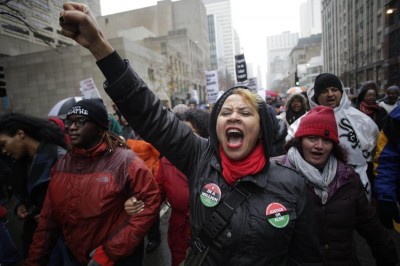
CHICAGO, IL – NOVEMBER 27: Demonstrators protest the shooting of Laquan McDonald along the Magnificent Mile November 27, 2015 in Chicago, Illinois. (Photo by Joshua Lott/Getty Images)
In at least four officers’ cases, criminal court judges found the cops lied under oath during a trial. Court records show those four officers alone were listed as witnesses in at least 48 cases after prosecutors began receiving notices about them.
Overall, officers who appeared in notification memos were called to testify in cases resulting in more than 100 felony convictions from 2013-2018.
Across the country, thousands of defendants have gone to trial with no clear way to know that law enforcement witnesses had a history of misconduct.
More: Fired for a felony, again for perjury. Meet the new police chief.
David B. Green was among the officers who continued to patrol the streets despite a history of misconduct.
In 2011, Little Rock police suspended Green after he bashed a handcuffed suspect’s face into the ground during an arrest, then lied about it.
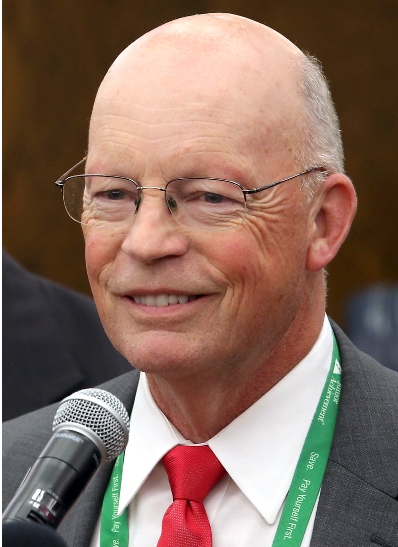
Former Little Rock Police Chief Stuart Thomas
Green claimed the suspect resisted him by trying to stand up during the encounter. A department review of body camera footage showed that the suspect didn’t try to stand. Two other officers were holding the man down while Green beat him.
Green was suspended for 30 days for untruthfulness and excessive force. His personnel file includes at least 19 suspensions and reprimands for offenses including domestic violence, excessive force and neglect of duty.
Green, who unsuccessfully appealed the charges against him, could not be reached for comment. In an interview conducted as part of an internal affairs investigation, Green did not deny the allegations against him but expressed dedication toward his job. “Even though I get to work and I may not go home, I still love this job,” he said. Department records show he is a military veteran and received commendations in 2000 and 2005 for taking lifesaving actions.
Until November 2015, Green continued to patrol Arkansas’ largest city. His word was relied upon to arrest and help convict defendants.
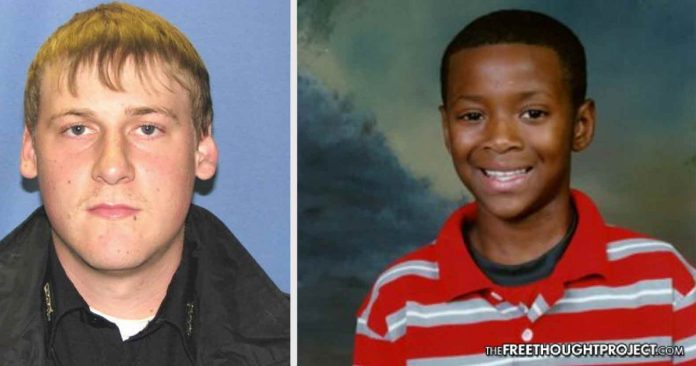
Little Rock cop Josh Hastings, who had long record of misconduct and was the son of a former Little Rock police captain, killed Bobby Moore, 16, in 2012. A civil jury found him liable.
Former Little Rock Police Chief Stuart Thomas disclosed in legal proceedings that his agency doesn’t inform anyone at the courthouse about problems with his officers.
“We don’t maintain or forward a result of every disciplinary action to either the U.S. attorney or the state court,” Thomas said in a deposition in 2013. “I’m not aware that we provide a list or a continuing update or anything like that.”
USA TODAY reviewed discipline files for Little Rock police officers going back 15 years, then compared them with court records. The analysis found officers who the department determined lied or committed crimes were witnesses in at least 4,000 cases.
Officer Kenneth Thompson filed a report falsely claiming no one was injured after he knocked a suspect off his chair in 2005, despite video evidence to the contrary. He was suspended by the police department for 30 days. His sworn testimony has been used in at least 687 criminal cases since then.
Pulaski County Chief Deputy Prosecutor John Johnson
Pulaski County Officers James Stanchak and Michael Terry were suspended in 2011 after they were caught on body camera video conspiring to lie about using force while arresting a man at a football game. Stanchak’s sworn statements have since been used in 222 cases. Terry’s have been used in four.
Officer Eugene Gray was suspended for 30 days in 2008 after he lied to internal affairs investigators about an off-duty arrest he never reported. During that arrest, he seized a cellphone that was never turned into the police department as evidence. Gray’s word has been used in 256 prosecutions since 2009, court records show.
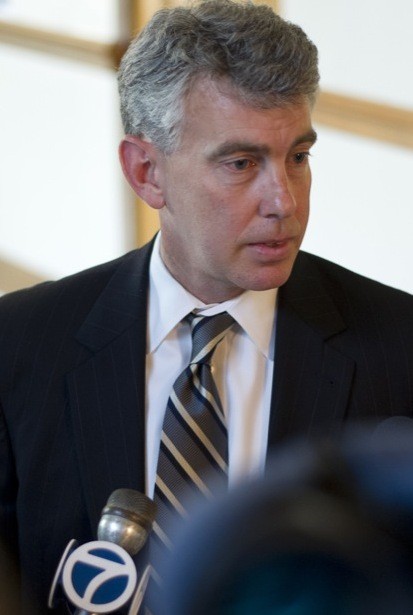
Pulaski County Deputy Prosecutor John Johnson
Pulaski County Chief Deputy Prosecutor John Johnson, whose office prosecutes cases in Little Rock, said the prosecutor’s office handles cases properly when it is aware an officer participating in a criminal proceeding has been disciplined.
“When this office is made aware of disciplinary actions by an officer (and) they’re going to testify as a witness,” he said, “we disclose that to the judge and let the judge make an independent finding as far as whether or not something is admissible pursuant to Brady.”
Failing to disclose officers’ past lies and bad acts can lead to wrongful convictions.
National Registry of Exonerations: 987 people exonerated in cases involving prosecutorial misconduct and perjury or false report by police
Since 1988, data from the National Registry of Exonerations shows 987 people have been convicted, then exonerated in cases that involved a combination of official misconduct by prosecutors and perjury or a false report by police and other witnesses. They spent an average of 12 years each behind bars.
The registry shows a rapid increase in exonerations in such cases. There were 112 in 2018 stemming from government misconduct in the prosecution – up from 48 in 2008.
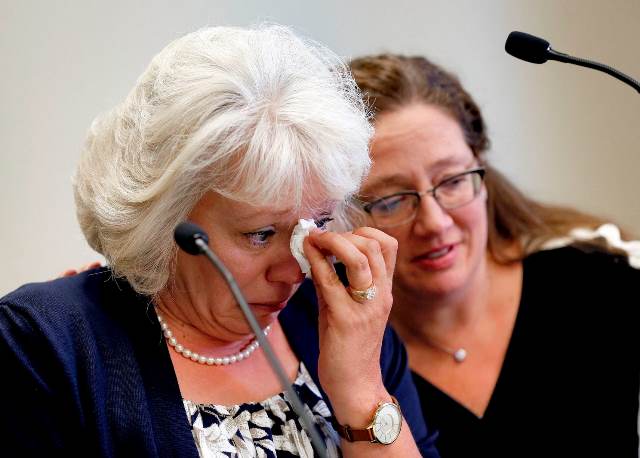
Debra Milke cries as she is embraced by Attorney Lori Voepel, right, during a news conference, March 24, 2015, Phoenix. Milke spoke out for the first time after spending two decades on death row in the killing of her son. In 2013, Milke was freed after 25 years in prison.Matt York, AP
Among those wrongly convicted was Debra Milke.
After returning from a trip to see Santa Claus at the Metrocenter mall in Phoenix, Milke’s 4-year-old son, Christopher, asked her if he could go back.
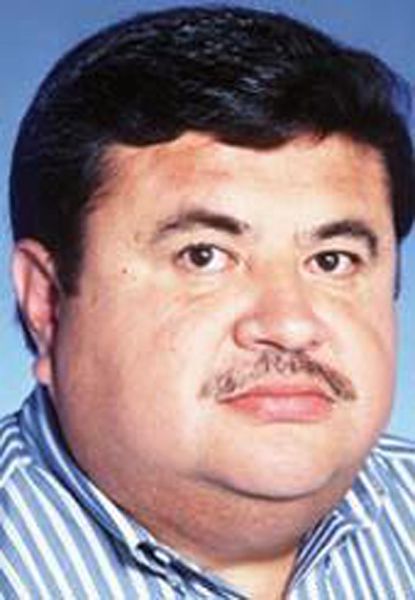
Phoenix Det. Armando Saldate, Jr.
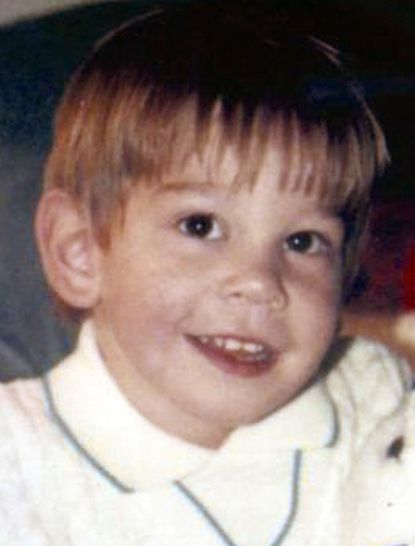
Christopher Milke
Milke sent Christopher back to the mall with a friend, James Styers, who drove him to a nearby ravine and shot him three times in the head.
Styers and another man were convicted of the murder, but so was Milke, on the word of a Phoenix detective, Armando Saldate Jr., who interrogated Milke and concluded she plotted the killing.
During Milke’s trial, evidence was withheld from her and her attorneys: Saldate’s police personnel file, which detailed eight cases in which indictments or convictions were thrown out because Saldate lied or otherwise violated a defendants’ rights.
In 2013, Milke was freed after 25 years in prison.
_____________________________________________________________
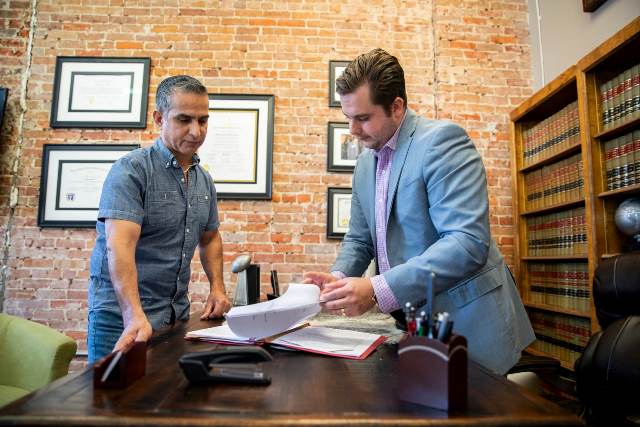
Revat Vara, left, who spent 11 years in prison for a wrongful DWI conviction, speaks with his lawyer Maverick Ray, right, in Houston. Vara studied the law in prison as he worked with his legal team to win his release in 2017.Scott Dalton for USA TODAY
For Revat Vara, the cost of 11 years behind bars has been heavy.
Vara’s father died one week after his trial. His mother contracted leukemia while he was in prison, and he was unable to care for her. Two years after his release, he struggles to pick up his life.
“Once the structure of the family goes … pretty much everything starts falling apart,” he said.
Vara said he grew up in a low-income community in Houston, and his formal education ended at eighth grade. He made his living before his arrest working odd jobs in a convenience store and at a plant.
Once he found himself behind bars, Vara said, he began contacting attorneys to ask for help with an appeal.
He couldn’t afford the legal help, but one lawyer sent him information about Lindsey’s history of misconduct – which was well known among local defense attorneys.
Vara researched how to file legal appeals on his own.
“I knew I could never trust nobody again,” he said. “The only way that I’m going to do this is I got to study the law. I’ve got to get in that law library and fight for my freedom.”
Vara said he spent two hours every day in the library. He was allowed a double session on Thursdays and Saturdays. He convinced one corrections officer to spend her lunch in the library to give him an extra hour.
It worked. But Vara is still trying to put his life back to together on the outside.
Still living in Houston after his release from prison, Vara said he hopes to attend law school or start a nonprofit group to educate youth in his community about the law. He said he is not angry at the officer whose testimony put him in jail, but he is frustrated that the criminal justice system allowed the cop’s misconduct to go on in secret for years.
“It wasn’t Mr. Lindsey’s fault, it was the public’s fault,” Vara said. “Mr. Lindsey was allowed to do what he did because they allowed him to do it.”
Supplemental stories by this team:
Fired for felony, then perjury. Meet the new police chief.
Police misconduct: Discipline records for thousands of cops uncovered
Search the list of more than 30,000 police officers banned by 44 states.
Death at the hands of police galvanizes mother
The team behind this investigation
REPORTING AND ANALYSIS: Mark Nichols, Eric Litke, James Pilcher, Aaron Hegarty, Andrew Ford, Brett Kelman, John Kelly, Matt Wynn, Steve Reilly, Megan Cassidy, Ryan Martin, Jonathan Anderson, Andrew Wolfson, Bethany Bruner, Benjamin Lanka, Gabriella Novello, Mark Hannan
FROM THE INVISIBLE INSTITUTE: Sam Stecklow, Andrew Fan, Bocar Ba
EDITING: Chris Davis, John Kelly, Brad Heath
GRAPHICS AND ILLUSTRATIONS: Jim Sergent, Karl Gelles
PHOTOGRAPHY AND VIDEOGRAPHY: Phil Didion, Christopher Powers, David Hamlin, Robert Lindeman
DIGITAL PRODUCTION AND DEVELOPMENT: Spencer Holladay, Annette Meade, Craig Johnson, Ryan Marx, Chris Amico, Josh Miller
SOCIAL MEDIA, ENGAGEMENT AND PROMOTION: Anne Godlasky, Alia Dastagir, Felecia Wellington Radel, Elizabeth Shell





how far back does this goes and i want to know about the brady list for detroit there have been many false statements abuse of power ineffective counsel that i would like to look into and address.
Many police officers are racists. They use their power to manipulate black people against crime they didn’t even commit. I hope these officers will get their karma. Salute to those police officers that are truthful and kind.